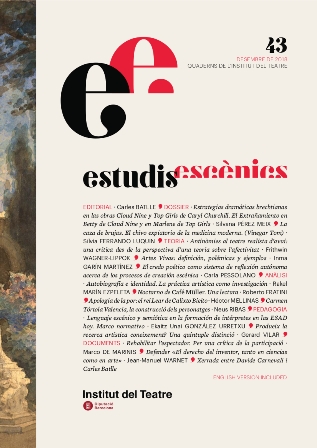«Café Müller»’s Nocturne. A Reading
Article Sidebar

Main Article Content
Roberto Fratini
This paper analyses the phraseologies, poetical aims and themes of Pina Bausch’s Café Müller (1978), trying to underline, on the one hand, the multiple links between its poetics and the forms of anachronism in the German culture of the sixties-seventies, mainly in relation to the memory of the Second World War and of the predominating currents of Ausdruckstanz, to justify, on the other, on a structural basis (through the analysis of some groundbreaking proceedings like repetition, desynchronisation, allegory) the fame of the piece as a masterwork of contemporary Tanztheater and as a paradigm of the so-called “silent dramaturgy”.
Keywords
Bausch, Tanztheater, theatre-dance
Article Details
How to Cite
Fratini, Roberto. “«Café Müller»’s Nocturne. A Reading”. Estudis escènics: quaderns de l’Institut del Teatre, no. 43, https://raco.cat/index.php/EstudisEscenics/article/view/354458.
Most read articles by the same author(s)
- Roberto Fratini, L'escena catalana: Balanç d'una dècada (2000-2010). Perifèries, periples, perills. La nova dansa catalana i les poètiques de l'errar , Estudis escènics: quaderns de l'Institut del Teatre: No. 38 (2011)
- Roger Bernat de Naeyer, Roberto Fratini, FFF: The Friendly Face of Fascism. For an Aesthetics of Devices , Estudis escènics: quaderns de l'Institut del Teatre: No. 44 (2019): «Dossier: Theatre and City. Pre-existing scenographies»
- Roberto Fratini, La escena catalana: balance de una década (2000-2010). Periferia, periplos, peligros. La nueva danza catalana y las poéticas del errar , Estudis escènics: quaderns de l'Institut del Teatre: No. 38 (2011)
- Joan Casas, Ixiar Rozas, Christina Schmutz, Frithwin Wagner-Lippok, Boris Daussà-Pastor, Roberto Fratini, Agustí Ros, Ester Vendrell i Sales, Raimon Àvila, Mariana Jaroslavsky, ABSTRACTS IN ENGLISH. Estudis Escènics Nº 35 , Estudis escènics: quaderns de l'Institut del Teatre: No. 35 (2009)
- Roberto Fratini, Notes for a Symposium , Estudis escènics: quaderns de l'Institut del Teatre: No. 46 (2021): Dossier: «"I’m Playing!" Formats, Devices and Apparatuses of Interaction (in Relational Theatre)»